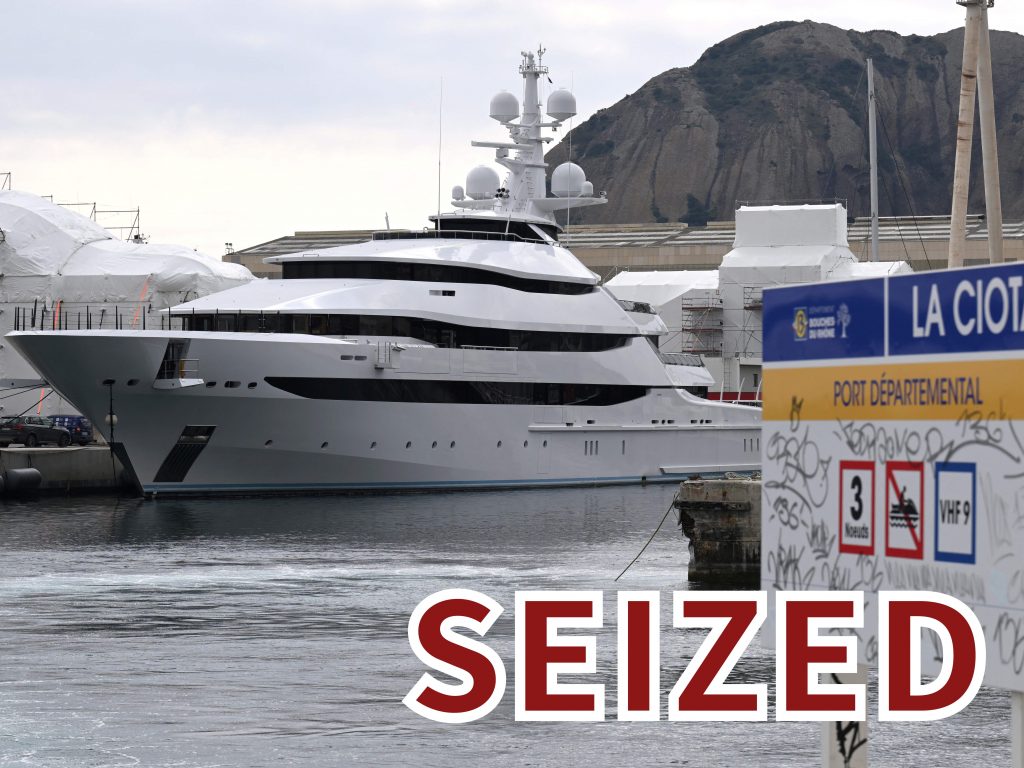- Dozens of superyachts belonging to Russian oligarchs were seized amid the attack on Ukraine.
- Impounding yachts could not be easier but the legal process is murky, experts told Insider.
- Finding the beneficial owner – who is the actual owner – is the trickiest part of the process.
The impounding process of the dozen superyachts seized from Russian oligarchs is relatively simple but finding the actual owner can be tricky.
As part of a series of sweeping global sanctions recently imposed against Russia for its invasion of Ukraine, Russian billionaires have had their multimillion-dollar superyachts seized by governments. Earlier this month, Italy seized a $578 million megayacht belonging to Andrey Melnichenko, France seized a $120 million vessel owned by Igor Sechin, and Spain seized a $153 million superyacht linked to Sergei Chemezov.
Most recently, a superyacht docked in Italy that is rumored to be linked to Russian President Vladimir Putin has had its Russian crew disappear and is now under the control of a British crew. Local authorities had been investigating the vessel but proving the yacht belongs to Putin is no small task.
Insider previously reported that without crews to maintain the superyachts seized, which are collectively worth billions, they could rapidly waste away. Four experts described how the sanctions against the Russian billionaires could lead to lengthy court battles over ownership of the assets that have been seized.
"The tricky part in all is to make the connection between the beneficial owner and the registered owner," Benjamin Maltby, partner at Keystone Law in the UK and an expert in yacht and luxury asset law, told Insider. "But all you have to do when there is an order to seize a yacht is to speak to the captain."
Impounding process
Todd Roberts, president of Marine Boat Works in California, told Insider it is "highly unusual for the government to seize a vessel unless it has been involved in a crime." Both Maltby and Roberts said that the seizure of Russian oligarchs' superyachts is "unprecedented."
However, the steps that European authorities have taken to seize the yachts do not allow the government to secure ownership of the vessel. In reality, the authorities have merely halted the ship's progress. This is because they would need to be able to prove a crime was committed in association with the vessel for the ship's ownership to be transferred, Roberts said.
"For anyone in England, someone from the Harbormaster office or a port police officer, will simply walk up the gangplank on the back of a yacht, go up to the captain, and will hand them an official piece of paper that prevents them from leaving," Maltby said.
In every port or harbor in the world, officials have the authority to tell yachts and ships where to go within the port and whether they can enter, and whether they can leave, per Maltby.
"The officer will say 'please, do not move the ship,' and it is no more dramatic than that," Maltby added.
Finding the owner
Roberts believes that what the government is doing to the oligarchs represents an overreach.
"It's a big stretch to say these ships are Russian-owned. The beneficial owner might be Russian, but these boats are owned and operated by contractors, managers," he said.
He added: "I don't even know who owns the boats that are in my own boatyard on any given day. I know the management company and business agent, but that's it."
Yachts are assets and can be a source of liability. According to Maltby, the beneficial owner — who is the actual owner – does not necessarily want the world to know that they are the owner.
Per Investopedia, a beneficial owner is a person who enjoys the benefits of ownership, though the property's title is in another name. Per Maltby, that's when the owning company comes into play.
"They will instruct lawyers to set up in an offshore jurisdiction an owning company," he said. "It is simply there to own the asset – it doesn't do business."
The tricky part, still, remains that "the beneficial owner will instruct what are called nominees, directors, and shareholders, who will typically be employees of the offshore law firm or corporate services provider," Maltby added.
Any ship needs to be registered in a ship registry. Due to the registry being a matter of public record, it is possible for anyone to know the name of the owning company by physically going there and look for the owner of the yacht.
However, the names shown will likely be of people "that are normally not ultra-high net worth individuals. They tend to be secretaries, assistants from the law firm or corporate service provider, and they are called nominees," Maltby said.
He added: "The nominee agreements will be between the beneficial owner and the law firm or corporate services provider – but that's not available to the public. So there's no easy way, certainly, of finding out who the beneficial owner actually is."
In the meantime, some of the world's most expensive superyachts hang in the balance. While the Russian oligarchs are still technically responsible for the yachts, if European authorities do not take responsibility for the yachts' care they will quickly waste away.
